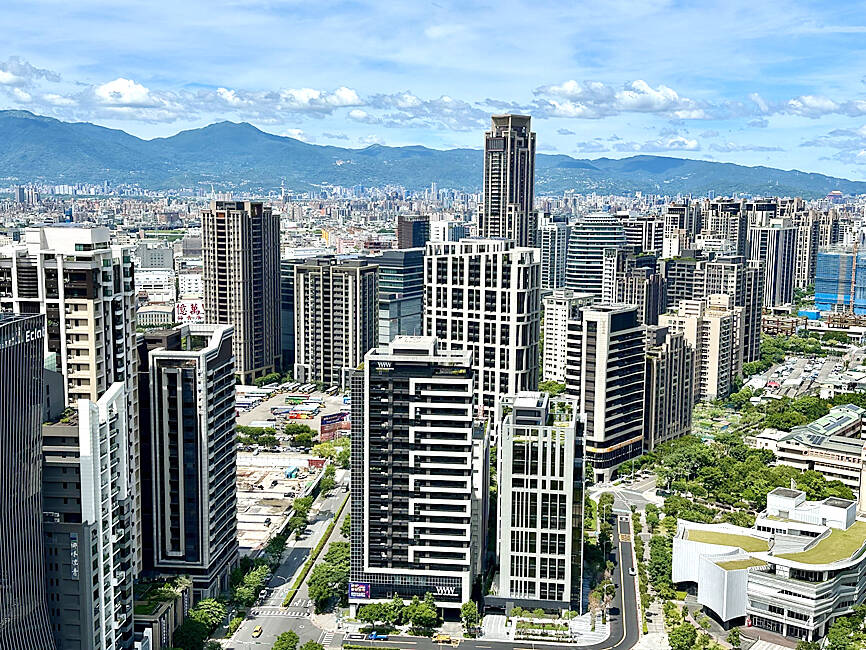The business climate monitor for northern Taiwan’s housing market flashed “yellow-blue” for the fifth time last month, signaling continued weakness as tighter lending conditions dampened demand, the property research publication My Housing Monthly (住展雜誌) said.
The gauge, which tracks supply, transactions and asking prices, stood at 38.2 — a level comparable to the COVID-19 pandemic — reflecting sluggish sentiment in presale and new housing markets. Transaction volumes, prospective buyer visits and projects awaiting sale have declined, while price concessions remained largely stable.
Headwinds have intensified as the market entered the second half of the year, with summer vacations, Ghost Month and US tariffs weighing on buyer sentiment, said Chen Ping-chen (陳炳辰), the publication’s research director and spokesman.

Photo: Hsu Yi-ping, Taipei Times
Developers have grown more cautious, with overall presale project volume dropping by about NT$10 billion (US$332.7 million) to just above NT$60 billion. Only one project in Taipei’s Zhongzheng District (中正) has potential sales exceeding NT$10 billion, a major threshold.
Newly completed units rose by about 30 to more than 200, a modest increase offering limited support amid high prices and strict mortgage conditions, Chen said.
Only flagship projects in prime locations by well-capitalized developers, or newly launched presale projects in their “honeymoon period,” have drawn dozens of weekly visitors and occasional sales. However, for most projects, sluggish weekly showings and zero transactions have become the norm, he said.
The number of projects for sale climbed to 1,375, up more than 40 from June, with New Taipei City and Taoyuan recording the steepest gains. Many projects require years to clear inventory, even as new supply continues to arrive, highlighting a “trapped” market that is unable to sell yet compelled to launch new units, he said.
Asking and transaction prices remain closely aligned, generally within a 10 percent range, but Taipei, where high housing prices create pockets of negotiation, is an exception. Premium projects in Daan District (大安) contrast with more affordable options in Wanhua (萬華), Wenshan (文山), and Neihu (內湖) districts, generating measurable bargaining room.
In other administrative regions, developers have largely maintained prices to avoid potential cascading effects, sustaining pricing despite slower sales.
Amid this backdrop, many developers are postponing project launches until next year, making it unlikely that the upcoming Sept. 28 sales season would generate significant momentum.
Popular battlegrounds — New Taipei City’s Linkou District (林口), Taoyuan’s Guishan (龜山) and Zhongli (中壢) and Hsinchu’s Jhubei (竹北) — could see few project debuts during the season, Chen said.

PERSISTENT RUMORS: Nvidia’s CEO said the firm is not in talks to sell AI chips to China, but he would welcome a change in US policy barring the activity Nvidia Corp CEO Jensen Huang (黃仁勳) said his company is not in discussions to sell its Blackwell artificial intelligence (AI) chips to Chinese firms, waving off speculation it is trying to engineer a return to the world’s largest semiconductor market. Huang, who arrived in Taiwan yesterday ahead of meetings with longtime partner Taiwan Semiconductor Manufacturing Co (TSMC, 台積電), took the opportunity to clarify recent comments about the US-China AI race. The Nvidia head caused a stir in an interview this week with the Financial Times, in which he was quoted as saying “China will win” the AI race. Huang yesterday said

Nissan Motor Co has agreed to sell its global headquarters in Yokohama for ¥97 billion (US$630 million) to a group sponsored by Taiwanese autoparts maker Minth Group (敏實集團), as the struggling automaker seeks to shore up its financial position. The acquisition is led by a special purchase company managed by KJR Management Ltd, a Japanese real-estate unit of private equity giant KKR & Co, people familiar with the matter said. KJR said it would act as asset manager together with Mizuho Real Estate Management Co. Nissan is undergoing a broad cost-cutting campaign by eliminating jobs and shuttering plants as it grapples

The Chinese government has issued guidance requiring new data center projects that have received any state funds to only use domestically made artificial intelligence (AI) chips, two sources familiar with the matter told Reuters. In recent weeks, Chinese regulatory authorities have ordered such data centers that are less than 30 percent complete to remove all installed foreign chips, or cancel plans to purchase them, while projects in a more advanced stage would be decided on a case-by-case basis, the sources said. The move could represent one of China’s most aggressive steps yet to eliminate foreign technology from its critical infrastructure amid a

MORE WEIGHT: The national weighting was raised in one index while holding steady in two others, while several companies rose or fell in prominence MSCI Inc, a global index provider, has raised Taiwan’s weighting in one of its major indices and left the country’s weighting unchanged in two other indices after a regular index review. In a statement released on Thursday, MSCI said it has upgraded Taiwan’s weighting in the MSCI All-Country World Index by 0.02 percentage points to 2.25 percent, while maintaining the weighting in the MSCI Emerging Markets Index, the most closely watched by foreign institutional investors, at 20.46 percent. Additionally, the index provider has left Taiwan’s weighting in the MSCI All-Country Asia ex-Japan Index unchanged at 23.15 percent. The latest index adjustments are to